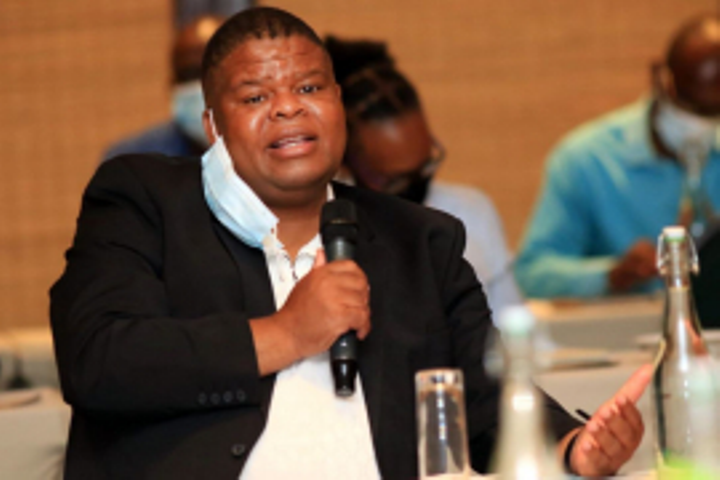Mahlobo Urges Fast-Tracking of Delmas Wastewater Plant Amid Rising Pollution Risks
Deputy Minister Mahlobo concluded the site visit with a stern directive: the contractor must present an updated, realistic project plan with a clear timeline and deliverables.

- Country:
- South Africa
Water and Sanitation Deputy Minister David Mahlobo has issued a strong call for urgent acceleration of construction work at the Delmas Waste Water Treatment Works (WWTW) in the Victor Khanye Local Municipality, Mpumalanga. The appeal was made during an oversight visit to the site on Monday, where Mahlobo was accompanied by Victor Khanye Executive Mayor Vusi Buda and Nkangala District Executive Mayor Thomas Ngwenya.
The visit aimed to assess the lagging progress on Phase 2 of the R300 million upgrade project—funded by the Department of Water and Sanitation (DWS) through the Water Services Infrastructure Grant (WSIG), with Nkangala District Municipality appointed as the implementing agent. Phase 1, which dealt with refurbishing the aging infrastructure, had been carried out by the Victor Khanye Local Municipality.
Concerns Over Contractor's Performance
Deputy Minister Mahlobo did not mince words when addressing the current state of the project, expressing disappointment with the contractor's performance and demanding a practical, revised action plan that ensures rapid and reliable completion.
"The contractor must take this matter seriously and provide a realistic schedule that includes tangible milestones. We cannot allow continued delays when communities are suffering, and the environment is being degraded," Mahlobo stated.
Environmental Consequences and Legal Action
The environmental ramifications of the plant's inefficiency were at the core of Mahlobo's concerns. He highlighted the plant's ongoing discharge of partially treated wastewater into the Bronkhorstspruit River—a tributary of the vital Olifants River system—warning that the pollution poses a serious threat to public health and biodiversity.
In fact, the Department of Water and Sanitation had previously opened a criminal case against the Victor Khanye Local Municipality for violating environmental and water regulations through ongoing pollution.
"These are not just administrative failures; they are crimes against nature and our communities," Mahlobo declared. "We pushed for funding because we needed to help the municipality stop this environmental degradation."
Plant Operating Beyond Capacity
Originally designed to treat 4.5 megalitres per day (ml/d), the existing Delmas WWTW is now processing approximately 8.5 ml/d—almost double its intended capacity. The overloaded system cannot adequately treat the domestic and industrial effluent it receives from Delmas, Delpark, and Eloff, resulting in high levels of E. coli and other pollutants in the discharge.
The upgrade, once completed, will expand the plant's treatment capacity to 11.5 ml/d. A critical part of the upgrade includes installing state-of-the-art technology aimed at improving treatment efficiency and ensuring treated effluent complies with national water quality standards before being released back into natural watercourses.
Technical and Logistical Challenges
The project, launched in 2022 and initially scheduled for completion by May 2024, has suffered multiple setbacks. Among the challenges were:
-
Prevalence of underground water at the construction site, necessitating complex sub-soil drainage systems.
-
Controlled rock blasting in areas adjacent to existing infrastructure, which had to be handled delicately.
-
Delays in procurement of materials and payment of workers by the contractor, leading to intermittent site closures.
-
Unfavourable weather conditions, which halted work during key construction periods.
Mahlobo emphasized that these challenges, while legitimate, should have been anticipated and addressed through contingency planning. He warned that further delays would not be tolerated, especially as the environmental and public health risks continue to escalate.
Comprehensive Infrastructure Upgrade
The second phase of the project includes a full suite of civil, mechanical, and electrical works:
-
Construction of new inlet works and electrical panel buildings
-
Installation of secondary settling tanks and biological reactors
-
Establishment of sludge and recycling pumps
-
Implementation of an advanced sludge treatment and disinfection system
-
Upgrading of piping and access walkways for operational safety and efficiency
These upgrades are not just about increasing capacity but also about modernising the treatment process to reflect global best practices in wastewater management.
The Road Ahead
Deputy Minister Mahlobo concluded the site visit with a stern directive: the contractor must present an updated, realistic project plan with a clear timeline and deliverables. He also reaffirmed the department's commitment to holding all stakeholders accountable and ensuring that taxpayer money is used efficiently.
"We owe it to the people of Delmas, and to all South Africans, to protect our water resources and build infrastructure that works—not just for today, but for generations to come," Mahlobo said.
The pressure is now on the project's stakeholders to overcome delays and deliver a functioning wastewater treatment system that meets the region's growing needs while safeguarding the environment.









